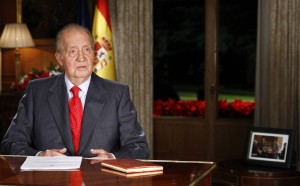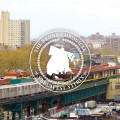Spanish King Juan Carlos speaks during his traditional Christmas message at Zarzuela Palace in Madrid December 24, 2013. REUTERS/Andres Ballesteros
By Fiona Ortiz
MADRID (Reuters) – The Spanish king’s traditional Christmas Eve address did not air on Catalonia’s public television on Tuesday for the first time in the broadcaster’s 30-year history, highlighting growing separatist fervor in the wealthy north-eastern region.
Workers at the broadcaster went on a brief strike during the king’s speech and other programming was aired instead. The official reason was to protest cost cuts and outsourcing of some production. Catalonia has clashed with the central government in Madrid over cuts on spending on public services.
In his address, King Juan Carlos did not directly discuss the contentious issue of Catalan independence, but he made a strong appeal to Spaniards to unify and embrace their diversity as the country struggles to emerge from a deep five-year economic crisis that has left one in four workers out of a job.
“Together we have resolved problems even more difficult than the ones we face today and we’ve always aimed for the same common goal,” the king said. “Spain is a great nation that is worth fighting for.”
Catalonia – which has its own language – is home to 7.6 million people and produces about a fifth of Spain’s economic output. Its leader, Artur Mas of the centre-right CiU political alliance, is pushing for a referendum on November 9 next year on independence from Spain.
That would be two months after Scotland holds a similar vote on whether to break from the United Kingdom.
Spanish Prime Minister Mariano Rajoy says the Catalan plebiscite would be unconstitutional and has vowed to block it in Parliament and in the courts.
Mas’s referendum drive may prove a political dead end for him and his party. If the central government blocks the plebiscite, his coalition with radical independence party the Catalan Republican Left, or ERC, could fall apart and force him to call early elections. Polls show he would lose the election to the ERC.
BREAKAWAY
Catalonia has long had a strong movement for nationalism – primarily as a push for greater autonomy within Spain.
But in recent years a more radical independence movement has taken root and polls show roughly half of Catalans would vote for full independence if there were a referendum.
Cost cutting imposed by the Spanish central government due to the economic crisis, perceptions of unfair tax treatment and constant tussles with Madrid over self-governing powers have all fuelled the independence movement.
Public television in the Basque Country, another highly devolved region ruled by a nationalist party, did not transmit the King’s speech on Tuesday either. But 30-year-old Basque public television EiTB has rarely broadcast the speech, as the Basque Nationalist Party, or PNV, is historically critical of the monarchy.
Juan Carlos has been on the throne 38 years and is considered a key player in Spain’s transition to democracy in the 1970s after dictator Francisco Franco died.
The audience for his Christmas address has fallen somewhat in recent years as corruption charges against the king’s son-in-law have damaged the royal family’s credibility.
On Tuesday, the king said he knew he had to set an example for all Spaniards and called on politicians to meet the highest ethical standards.
A series of back and hip operations have raised questions over whether the king might abdicate, but he signaled he was not considering stepping aside by saying: “I’m determined to continue to encourage civic participation and faithfully serve my mandate.”
(Additional reporting by Arantza Goyoaga in Bilbao; Editing by Sonya Dowsett and David Brunnstrom)
















Follow Us